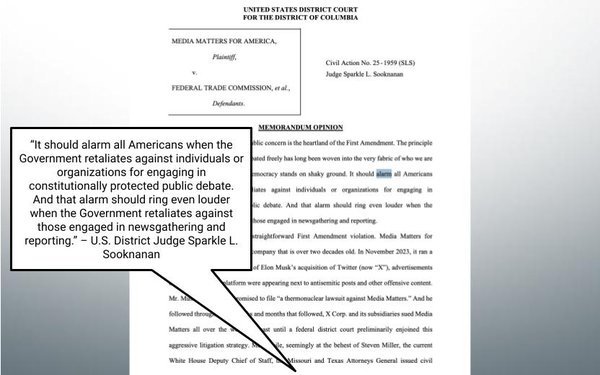Handing the
Federal Commerce Fee a defeat, a federal choose has blocked the company from making an attempt to power the advocacy group Media Issues to show over info referring to its crucial reporting about
adverts on X, previously Twitter.
In a ruling issued late Friday, U.S. District Court docket Choose Sparkle Sooknanan in Washington, D.C. discovered that Media Issues is prone to show that the
FTC acted with “retaliatory animus” and that its civil investigative demand (akin to a subpoena) due to this fact violates the First Modification.
“Speech on issues of public
concern is the heartland of the First Modification,” Sooknanan wrote in a 48-page opinion granting Media Issues’ request for a preliminary injunction agains the FTC.
“It ought to alarm all Individuals
when the federal government retaliates towards people or organizations for partaking in constitutionally protected public debate,” she added. “And that alarm ought to ring even louder when the federal government
retaliates towards these engaged in newsgathering and reporting.”
commercial
commercial
The ruling is available in a authorized battle that started in June, when Media Issues sued the FTC over its demand for a
host of data — together with all paperwork referring to the Interactive Promoting Bureau, World Federation of Advertisers and its now defunct International Alliance for Accountable Media, Test My Adverts,
the Middle for Countering Digital Hate, Double Confirm and NewsGuard, amongst different teams.
Media Issues alleged that the demand marked a “fishing expedition into probably the most
delicate areas of Media Issues’ journalism and advocacy.”
The group alleged the FTC undertook the probe in retaliation for a November 2023 report that adverts for Apple,
Bravo, IBM, Oracle and different manufacturers had been being positioned subsequent to pro-Nazi posts on X.
After Media Issues revealed its examine, it was sued by X and served with subpoenas by two
state attorneys basic — Ken Paxton of Texas and Andrew Bailey of Missouri.
Media Issues is fighting X’s lawsuit, and in addition sued to halt the attorneys basic
investigations.
A federal choose in Washington blocked Paxton’s investigation, ruling that Media Issues was prone to present that Paxton was retaliating towards the group for
newsgathering exercise that is protected by the First Modification. That ruling was upheld by the D.C. Circuit Court docket of Appeals final month.
Bailey abandoned his probe earlier than a choose issued a ruling.
Media Issues alleged in its criticism towards the FTC that in Could, a number of months after Republican Andrew Ferguson took over as chair, the company demanded materials related to X’s
lawsuit, paperwork concerning Media Issues’ funds and newsgathering, and knowledge concerning its affiliations with different advert organizations and watchdogs.
The FTC requested
Sooknanan to dismiss Media Issues’ criticism, arguing the group’s lawsuit was untimely as a result of the company hadn’t gone to courtroom to implement its demand for info.
Sooknanan rejected that
place.
“Nothing within the FTC Act means that Congress meant to declare open season on journalists by permitting a retaliatory FTC to resolve if and when its retaliation will probably be
reviewed by a federal courtroom,” she wrote.
The company additionally mentioned it did not particularly goal Media Issues, arguing that the group was amongst quite a few organizations to obtain
calls for for info concerning “probably illegal promoting boycotts.”
Media Issues responded in courtroom papers filed earlier this month that the FTC did not clarify why
it believed the group would have counters in its new “significant, related proof” concerning an promoting boycott.
The watchdog additionally made the broader argument that the
FTC’s present marketing campaign towards what it characterizes as “advertiser boycotts” is definitely “a politically motivated response to protected speech.”
FTC Chair Ferguson “has made
clear that, in focusing on what he calls ‘advertiser boycotts,’ he’s truly involved about content material moderation advocacy (i.e., protected speech) and impartial financial choices made by advertisers
who don’t need their adverts showing subsequent to extremist content material (i.e., lawful enterprise choices),” Media Issues wrote earlier this month.

